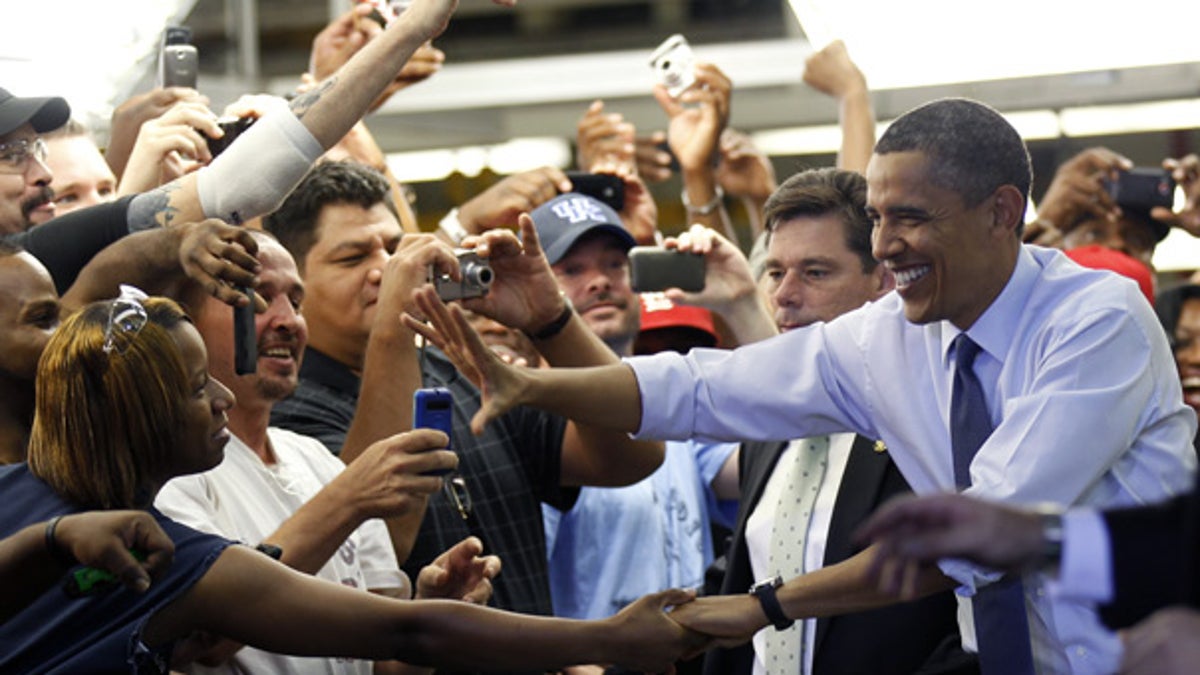
Aug. 5: President Barack Obama greets auto workers at Ford Motor Company Chicago Assembly Plant. (AP)
CHICAGO -- Even in President Barack Obama's hometown, they had hoped for more.
Obama will be stumping for Senate candidate and basketball buddy Alexi Giannoulias on Thursday in Chicago, a city where every other person crossing the street seems to have a story about descending on Grant Park that historic night of the 2008 election or proudly watching the president take the oath on television.
But nearly two years after Obama took office, while the president remains widely popular in the city, his image has slipped a bit as many people wonder where the promised change and jobs are, even if they believe such talk is probably a bit unfair.
"I talk to people, you know, who thought he would just have a magic wand," said Ira Acree, a pastor on the city's South Side, where Obama worked as a community organizer, taught law and still has a house.
Across the city this week, many Chicagoans acted a bit defensive or protective of Obama, who considers Chicago home despite being born in Hawaii. Obama has only visited a handful of times since he left for the White House, but his adopted hometown seems more willing to give him a pass than other places around the nation.
"They want him to succeed, unlike some places where they want him to fail," said Abner Mikva, a veteran political figure in Chicago, where's he been a Democratic congressman, federal appeals judge and political mentor to Obama. "Because he's ours."
Around Illinois, which leans strongly Democratic, Obama's approval ratings have fallen in some polls -- to 51 percent from 59 percent a year ago, according to a Tribune/WGN-TV survey in September.
But he still has drawing power for fellow Democrats. While Obama won't visit his former chief of staff, Rahm Emanuel, who left the White House last week to run for mayor, both Gov. Pat Quinn and Giannoulias will appear with him, hoping some of his star power can translate into votes in the November election.
One after another, residents said that in Chicago expectations were simply too high, that there was no way Obama could accomplish what they had hoped he would.
"They thought he would come in and all those long repressed desires of progressive folks would come true, that passage (of bills) would be easy and would be a matter of introducing the bills," said David Fagus, the Democratic committeeman for the 49th ward on the city's North Side.
Nowhere was that more true than in the black community.
Laverne Mangum, whose "Yes, Yes, Yes," could be heard over the other cheering Chicagoans who packed themselves into a restaurant the day of the inauguration, said some of her friends seemed to expect the change would come almost before they paid their tabs that day and walked outside.
"Being the first black president, most black people thought he was going to turn everything around (and) everything would be better for the underprivileged, the black people," Mangum said. "The expectations were really big."
The 66-year-old retiree, who defended Obama and said he's doing "the best job that he can do," said her friends may be onto something when pointing out the lack of jobs that still exist under Obama.
"He could have done more ..." she said. "He helped the banks, but what about jobs?"
Jason Rupp, 38, a software developer, applauded the president's ability to push through health care legislation, but suggested that battle distracted him from efforts to turn around the economy.
"I'd like to see him more focused on jobs, said Rupp, who voted for Obama.
Obama also has disappointed some in the city's Hispanic community because of what they see as his unwillingness to push immigration reform, said Omar Lopez, the chair of the Chicago Latino Coalition.
"They expected him to really bring change and they haven't seen it," he said.
There's even a bit of grumbling over Obama's comments about the city's fledgling mayor's race, which is suddenly wide open thanks to Mayor Richard Daley's announcement last month that he won't run for re-election to a seventh term.
Some residents didn't appreciate Obama's comments last month that then-chief of staff Rahm Emanuel would "be a terrific mayor."
"They want to know why he's talking about a local race," said 19th ward commiteeman Matt O'Shea, a supporter of Cook County Sheriff Tom Dart, a potential mayoral candidate.
At the same time, Chicagoans offer something to Obama that may be in shorter supply in other parts of the country: understanding.
"There's a lot of feeling that the one thing that has just made it so much more difficult is the Republican leadership's decision to absolutely dig in and say 'No' to everything," said Dawn Clark Netsch, a prominent Chicago Democrat who once served as state comptroller and ran unsuccessfully for governor.
"Obviously (Republicans) want the leadership back and this is one way of getting it," added Bettylu Saltzman, a Democratic donor perhaps best known in the city for predicting to friends, including David Axelrod, that a young man she'd met in 1992 named Barack Obama would be the country's first black president.
While many Chicagoans are quick to say they're willing to give Obama more time, that doesn't mean he's not on the clock.
"I don't know, we'll see," said Rupp, when asked if he'd vote for Obama again. But, he said, "I'm rooting for him, that's for sure."












































